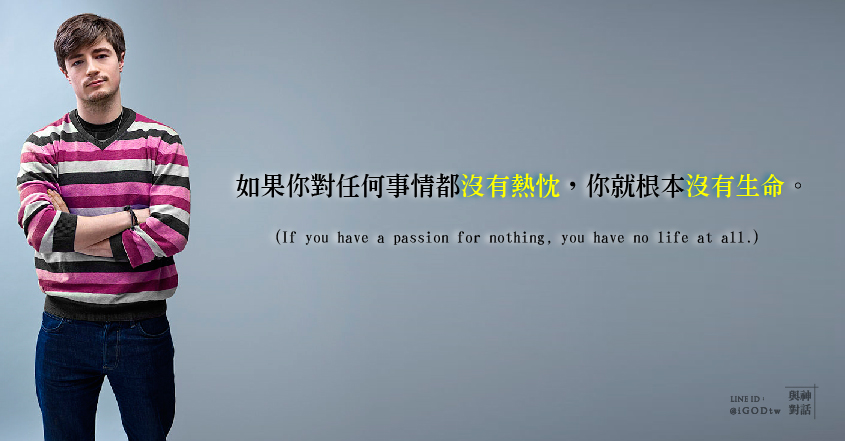
經由心智和身體的選擇,靈魂渴望我們去做有關它是什麼的某些較高選擇,以便它能在其自身的經驗裡認識它自己。引發我們做出「較高選擇」的最佳方法之一,就是跟隨自己的「熱忱」行事。
神:【「熱忱」是一種出自愛並處於愛的行動】2/2
殺死熱忱,你便殺死你內在的神性。熱忱是你內在的神性在對你說「Hi!」
但,你明白嗎,一旦神(或在你之內的神性)做了那有愛的事,神就已實現了祂自己,不再需要任何東西。
而在另一方面,人類則往往覺得他在他的投資上需要有所回報。如果我們要愛某個人,很好——但我們最好能得到一些愛的回報。 諸如此類的想法。
這不是熱忱(passion),這是期待(expectation)。
這是人類不快樂的最大根源。這是將人類從神性分離開的東西。
尋求終止這種分離的棄絕(renunciate),人類透過某些東方神秘主義者曾稱為三摩地 ( samadhi 或稱三昧 ) 的經驗。那是一種與神的合一;一種與神的融合,並融入神。

因此,棄絕(renunciate)是棄絕結果(和期待)——但永不、從不是棄絕熱忱。的確,大師直覺地知道,熱忱即道路。熱忱是走上實現較高自我(Self realization 活出較高版本的自己)的道路。
縱使以世俗的說法,也可以公平地說:如果你對任何事情都沒有熱忱,你就根本沒有生命(if you have a passion for nothing, you have no life at all)。
摘自《與神對話 I 》第5章
神:【「熱忱」是一種出自愛並處於愛的行動】1/2:https://5aebook.com/cwg/1-5-4/



Kill passion and you kill God. Passion is God wanting to say “hi.”
But, you see, once God (or God-in-you) does that loving thing, God has realized Itself, and needs nothing more.
Man, on the other hand, often feels he needs a return on his investment. If we’re going to love somebody, fine—but we’d better get some love back. That sort of thing.
This is not passion. This is expectation.
This is the greatest source of man’s unhappiness. It is what separates man from God.
The renunciate seeks to end this separation through the experience some Eastern mystics have called samadhi. That is, oneness and union with God; a melding with and melting into divinity.
The renunciate therefore renounces results—but never, ever renounces passion. Indeed, the Master knows intuitively that passion is the path. It is the way to Self realization.
Even in earthly terms it can be fairly said that if you have a passion for nothing, you have no life at all.

